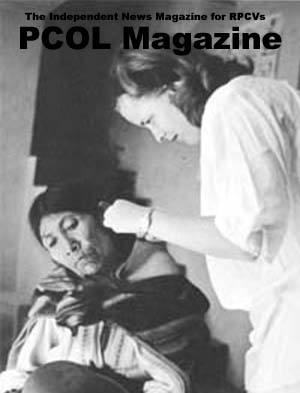
We need the Peace Corps as well as the Marine Corps
Redrafting America
Aug 2, 2004
America
by Terry Golway
'We need the Peace Corps as well as the Marine Corps.'
AS THE ROMAN world began to disintegrate and the emperor was far from home fighting wars on the Rhine, a group known as the Alemanni advanced from Germany to the very outskirts of the great global city. "In this emergency," wrote Edward Gibbon in his masterful tale of Rome's decline and fall, "the senators resumed the defense of the republic." The appearance of a large army gathered by the city's leading citizens inspired the Alemanni to retreat.
Gibbon noted that the emperor, Gallienus, was none too pleased, for if the city's nobles could rouse themselves to deliver Rome from barbarians, they might get a notion to deliver Rome from the emperor, too. To head off this unpleasant scenario, Gallienus ordered the senators to refrain from military service in the future.
"But his fears were groundless," Gibbon wrote. "The rich and luxurious nobles, sinking into their natural character, accepted, as a favor, this disgraceful exemption from military service; and as long as they were indulged in the enjoyment of their baths, their theaters, and their villas, they cheerfully resigned the more dangerous cares of empire to the rough hands of peasants and soldiers."
The dangerous cares of empire have not diminished since the fall of Rome. Neither has the division of labor.
With American troops fighting in Afghanistan and Iraq, and on the alert in other regions where our national interests are threatened, the harsh words of Gibbon ought to be cause for reflection. In fact, the rich, the powerful and the educated are pretty much exempt from military service, as any glance at the casualty lists from Iraq will indicate. The men and women returning home in flag-draped caskets generally are drawn from the other America, the America of small towns and decaying neighborhoods, the America of diminished opportunities. That's why the death in Afghanistan of former football star Pat Tillman was such a huge story.
As a college- educated, well-paid athlete, Tillman was, in effect, exempt from military service. But he enlisted anyway and died, from friendly fire, at age 27.
Another exception to the rule is the story of Sgt. Angela Carey and her daughter, Specialist Courtland Ball, both of whom are serving in Iraq. Sergeant Carey, a medic, is married to an emergency room doctor in Arkansas. Not many doctor's wives-or doctor's daughters-have taken up arms in the war on terror.
The inequity of sacrifice in the war on terror has inspired some to call for a return to the draft. And they do not mean the draft of the Vietnam era, where exemptions from service were disgraceful indeed, but the draft of the World War II era, where the rich served along with the poor, the famous with the unknown.
Many critics of the war in Iraq have noted that only one member of Congress has a child serving on the front lines. If more children of the rich and powerful were subject to military service, so the theory goes, politicians would be less likely to send troops into harm's way.
There's something to be said for the argument, for as a general rule, it is always better for the public if lawmakers understand in the most personal way the effect of the policies they support. Debate over, say, Social Security or health care policy would be served better if members of Congress did not have sizeable pensions awaiting them when they leave office, and if they were not the beneficiaries of a very generous, taxpayer-supported health plan.
Likewise, then, with war. Subject America's young people-all of them-to conscription, and perhaps politicians will be less enthusiastic about pre-emptive invasions of nations that may or may not possess weapons of mass destruction.
As alluring as this theory is, however, the draft debate focuses on the wrong solution to America's problems overseas. Too many people around the world, especially in regions that harbor our enemies, think of Americans as men and women wearing helmets, combat fatigues and body armor. If we are to win the war of public opinion- and, as we should have learned in Vietnam, unconventional war often is decided less by body count and more by opinion polls-we don't need a conscript army. We need an army of young, idealistic people armed with optimism and a sense of mission. And we need them at home as well as abroad.
To defeat our enemies and earn the respect and affection of those we have alienated, we need the Peace Corps as well as the Marine Corps. We need a new generation of young volunteers in the villages of Africa and the South Pacific, showing a generous and charitable side of America that has been forgotten in recent years.
If there is to be some sort of mandatory national service in the future, and many believe there will be, it would be a mistake to limit the idea of service to flying a fighter jet or manning a checkpoint. While we will need fighter jets and checkpoints to combat a ruthless foe-global terrorism-we will also need the services of young men and women eager to share their knowledge and resources with those not yet motivated by fear, hatred and envy.
Indeed, if the idea of mandatory national service were expanded to include working with the poor at home and abroad, the goals of the pro-draft forces might be realized. For if the children of the rich and influential returned home with firsthand accounts of poverty and despair elsewhere, the effect on public policy could only be beneficial.
Terry Golway
TERRY GOLWAY is a writer for The New York Observer.
Copyright America Press Aug 2-Aug 9, 2004

